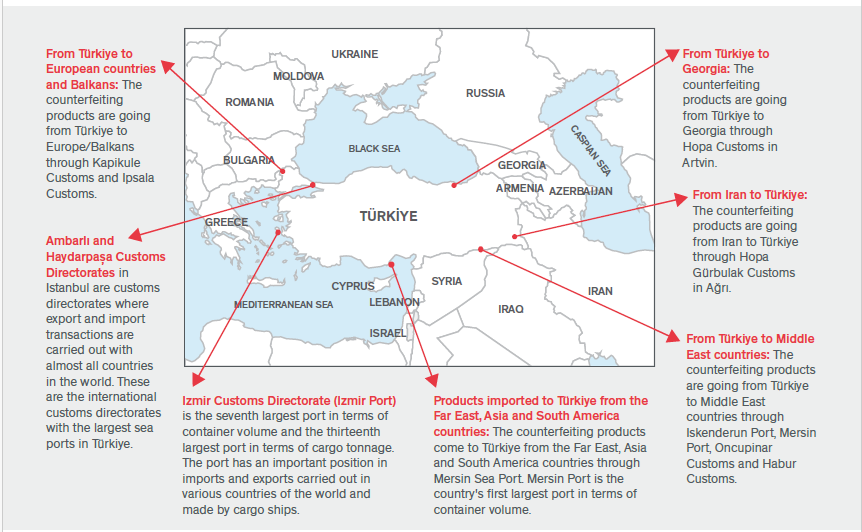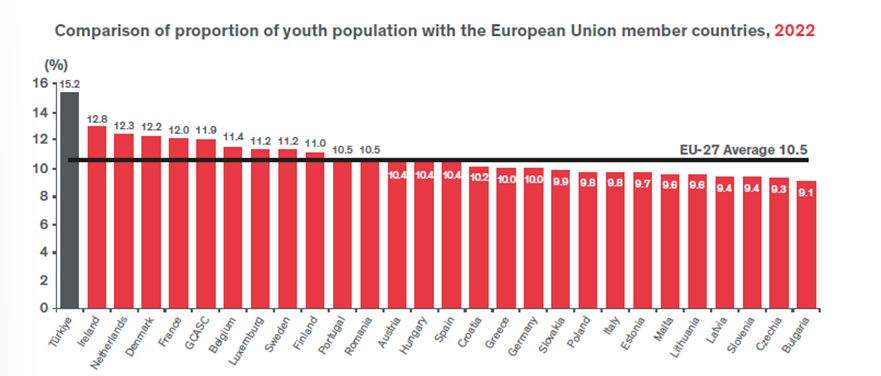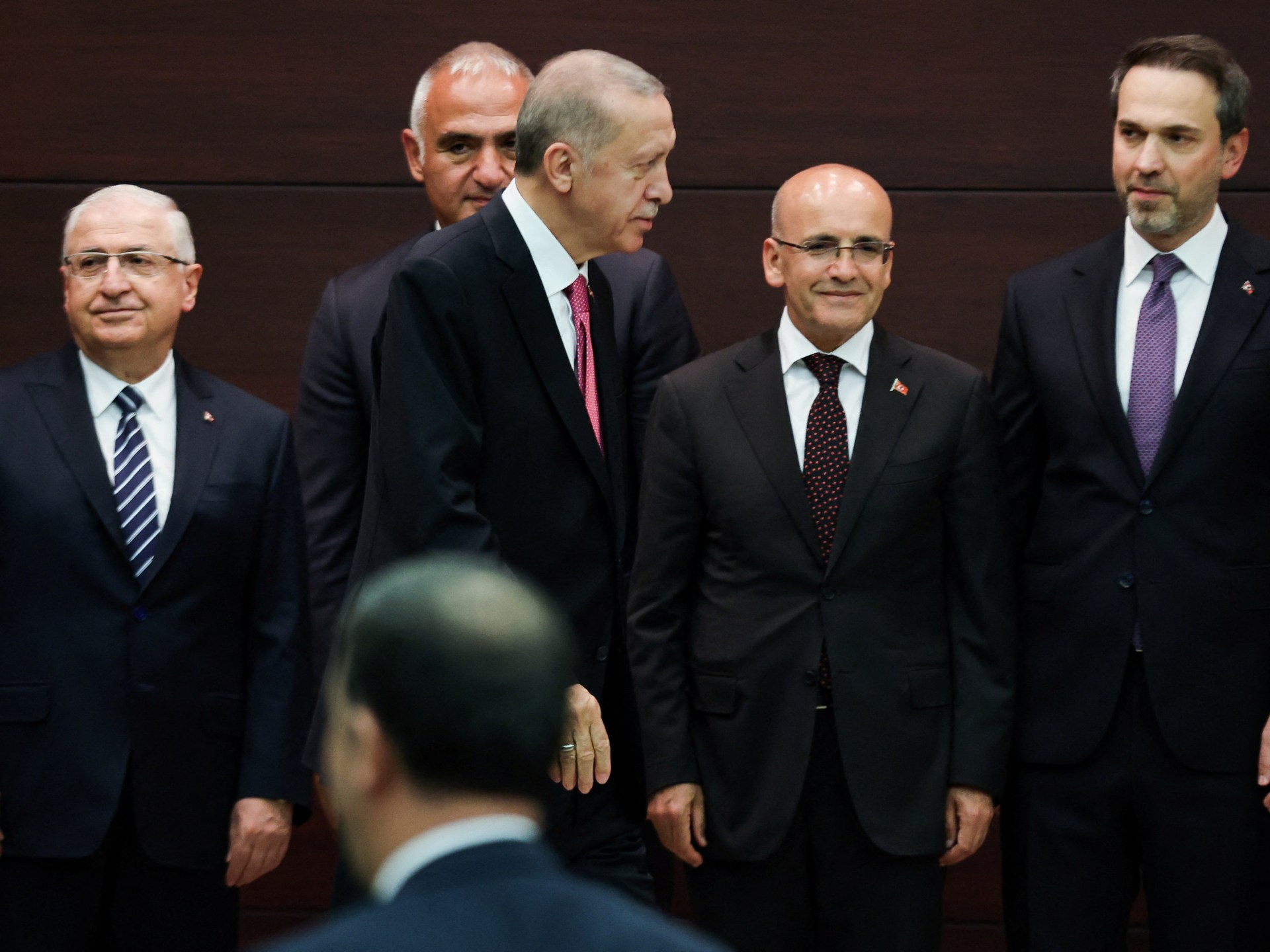Türkiye’s Geopolitical and Strategic Importance Regarding Counterfeiting Activities
Türkiye is one of the major internal markets for counterfeit products both in terms of production and widespread sales channels.
The European Commission’s 2022 Counterfeit and Piracy Watch List underlined the key role played by Türkiye in the fight against counterfeiting, not only in the transport but also in the production of counterfeit goods. According to the report, the primary countries of origin for counterfeit products entering the EU are China, accounting for roughly 70 percent, followed by Turkey at approximately 9 percent, and Hong Kong contributing approximately 6-6.5 percent. According to OECD-EUIPO reports covering the period 2011-19, these three economies accounted for almost 90% of counterfeit goods entering the EU market.
Türkiye has been identified as the main source of counterfeit clothing, clothing accessories and medicines, highlighting Tü rkiye’s critical geopolitical position in relation to EU public health concerns. In the report Türkiye’s significant role alongside Asian countries in supplying dangerous fake products was pointed out, with its geographical location amplifying its impact in Europe compared to the rest of the world.
Pursuant to the U.S. Chamber of Commerce- Global Intellectual Property Center 2016 report, Türkiye was ranked as the 4th largest economy in terms of global physical counterfeiting with a share of $ 1,720,857,842 and a percentage of 4.26% among 38 countries after China, Hong Kong, Ukraine, India and Russia.
According to many global research carried out; Türkiye has been listed as one of top counterfeiting countries:
- 4th globally in counterfeiting activities
- 2nd in luxury products and textiles after China
- 2nd in perfumes and cosmetics after China
- 5th in the piracy visits
Pursuant to the EUIPO’s report, especially air and sea transports were used for the transportation of the counterfeit goods from and to Türkiye.
The following customs directorates are not only one of the most important transit points, but also play an important role in Türkiye’s commercial activities and economic growth by facilitating the movement of goods and ensuring compliance with customs regulations and intellectual property rights.

Position of Türkiye in the World Counterfeiting Market:
Türkiye has emerged as a significant player in the global counterfeiting market, particularly in sectors like textiles, clothing, and cosmetics. Türkiye also has a particular reputation for producing high-quality luxury counterfeit items, such as leather goods.
Although there is counterfeiting activity throughout Türkiye, Istanbul is considered the country’s counterfeiting capital due to the high demand from the large population, the number of customs points and the advanced manufacturing industry in the city.
In the recent years, the International Chamber of Commerce (ICC), reported that Turkish law enforcement authorities seized $650 million worth of counterfeit goods. Türkiye is also a very significant transit hub for shoes, bags, clothes, perfume products, medicines and spare parts.
- Global Ranking: According to OECD reports on global counterfeiting, Türkiye consistently ranks within the top three countries involved in counterfeit activities. This ranking reflects the significant challenges posed by counterfeiting within the country.
- Strategic Location: Located between Europe, Asia, and the Middle East, Türkiye serves as a pivotal point for the transit and distribution of counterfeit goods. This strategic location facilitates the movement of fake products to various destinations, including neighboring European Union countries.
- Significant Distribution Hub: Türkiye has gained notoriety as Europe’s gateway for counterfeit goods. Reports indicate that a substantial number of counterfeit shipments seized globally originate from Türkiye, with many of these products destined for markets within the EU. While China remains the primary producer of counterfeit goods worldwide, Türkiye plays a crucial role as a distribution hub. It acts as a conduit for the distribution of counterfeit products, not only facilitating their transit but also engaging in the production of fake merchandise.
Target market in Türkiye and the impact of counterfeiting on the target market
As of 2023, Türkiye’s total population is approximately around 85 million. The rate of young population is also quite high; the proportion of young people aged 15-24 is around 16.7%. Türkiye has a dynamic demographic structure with its young population.

Considering the overall young population, 58% of Turkish consumers admit that they are regularly buying counterfeit products. The report by Türkiye’s Brand Protection Group stated that consumers are more likely to buy counterfeit shoes, handbags, watches, accessories and jewelry as fashion items, which fall into the expensive product category.
Cultural perspectives also appear to have a significant impact on the consumption of counterfeit goods. For example, the EUIPO (2017) reports that a higher percentage of consumer respondents in Cyprus, Greece, Lithuania, Bulgaria, Estonia, Slovenia, Malta and Latvia think that it is acceptable to buy counterfeit products if the price of the original product is too high (Europol and EUIPO, 2017). A similar perspective was observed in Türkiye, where respondents did not see any ethical or moral problems of buying counterfeit goods. That said, especially consumers in the age range of 18-35 have the potential to understand the harms of counterfeit products consciously and shift towards original products. This once again highlights the importance of raising awareness in the ϐight against counterfeiting among young population.
Conclusion
Counterfeiting is a pervasive problem which has substantial consequences, leading to a notable loss of tax revenue for the country and adversely affecting employment and foreign direct investment.
Despite Türkiye’s good level of legislation mostly aligned with the EU legislation and despite the efforts of the Enforcement Authorities to combat counterfeiting, Türkiye continues to face challenges due to its strategic geographic location, well-established manufacturing infrastructure, and sometimes inadequate enforcement of intellectual property laws.
Given that Türkiye is one of the leading countries for counterfeit products, to raise awareness concerning anti-counterfeiting measures in the market and among law enforcement agencies is essential to reduce the number of counterfeiting.
At this point, it is essential to note that awareness projects play a crucial role in combating counterfeiting. These projects have a significant impact by raising awareness among consumers about the harms of counterfeit products, aiming to protect the reputation of brands and combat illicit trade in fake goods.
The Unreal Campaign which has been organized by the International Trademark Association (INTA) since 2012, is a very good example to such awareness raising programs. The selects ambassadors in high schools and universities across the world to encourage young people to play a crucial role in combating counterfeiting.
Lastly, there is no need to say that it is crucial to pursue a combined strategy by IP right holders in Türkiye to be deterrent against counterfeiting such as border measures, participating in customs training, conducting online to offline investigations, locating the infringers and carrying out criminal and civil actions against the infringers. The implementation of tailor-made anti-counterfeiting program plays a key role, and we observe an important decrease of the counterfeiting activities at the outcome of the use of the effective tools and persistent efforts of the right holders in this fight.


